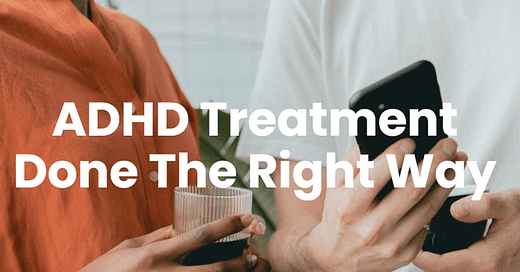The recent rise and fall of telehealth services like DONE, promising quick access to ADHD medication, hits home in a deeply personal way. While the legal ramifications are still unfolding, the scandal is a stark reminder of the importance of ethical marketing practices in healthcare. The story of Done’s executives being arrested broke today in the WSJ.
Here is my Personal Marketing Accountability take.
As a father of two children with ADHD, I deeply understand how serious and complicated it can be. Over the years, I've sought out the best doctors at top institutions worldwide to help my kids. As I write this, I'm about to pick up my son from school to take him to his doctor. We're constantly fine-tuning his ADHD medication regimen, a process that's always evolving. I know it's not as simple as just asking for help. There's a complex interplay of nature and nurture at work. Even the world's leading doctors haven't been able to pinpoint the root causes of ADHD and Autism or find definitive ways to improve the lives of those who suffer.
With that said, This is how Done works.
Check out their website: donefirst.com
Here, we have a company staffed by doctors who, one can only assume, endured the grueling years of medical school and residency. These individuals presumably dreamt of wielding their knowledge in a respected practice, helping patients through complex diagnoses and long-term care.
Instead, DONE presents them with a seemingly easy path – diagnose over a screen, prescribe medication, and move on to the next patient. One can't help but wonder what motivates such a doctor. Is it a genuine desire to help, albeit in a streamlined way? Or is it the allure of a low-pressure, high-volume practice that prioritizes profit over comprehensive care?
But what happened is actually much more egregious.
Done Global's alleged scheme, according to the Wall Street Journal, involved targeting vulnerable individuals seeking easy access to addictive substances, utilizing deceptive advertising to downplay risks and exploit regulatory loopholes. This blatant disregard for patient well-being has tarnished the company's reputation and raised concerns about the lack of accountability in telehealth marketing.
What matters? is that a box filled with pills? I am not sure I get it!!
Just take a quiz and lie to a doctor, and you will be on your way with pills you can abuse, sell… whatever you want!
Take a look at this: Done takes a severe problem and makes it seem like you can take a pill or talk to a doctor and things will be better in a month!
Done is trying to exploit a dangerous misconception about ADHD treatment. True management of ADHD is a marathon, not a sprint. Focusing solely on short-term solutions, like a one-month medication supply, ignores the complexities of the condition. Effective treatment often requires ongoing monitoring, adjustments, and potentially different approaches over time. This strategy preys on the very challenges ADHD presents, misleading customers into thinking a quick fix with pills is all it takes.
It's also frustrating that there's no link available for the survey claiming that a "magic pill" can solve mental health issues. And what’s worse is they conducted their own biased survey!
Mental health and well-being are serious matters that can't be addressed with quick fixes. It takes time and effort, and there's no one-size-fits-all solution.
The irony of the company's name, "Done," is not lost on anyone. Now that their fraudulent practices have been exposed, Done Global is undeniably "done."
Done Global's legacy is done, but the need for ethical marketing in telehealth is far from done.
This scandal underscores the urgent need for stricter regulations and oversight in telehealth marketing. Companies must be held accountable for advertising claims and prioritize patient welfare over profit.
Done’s social media presences:







Insane! Great research and insights, Jay.